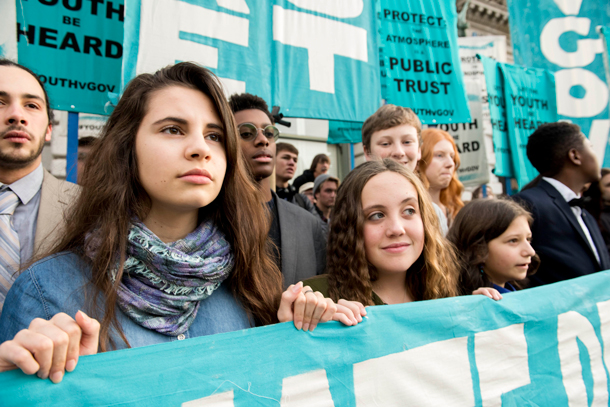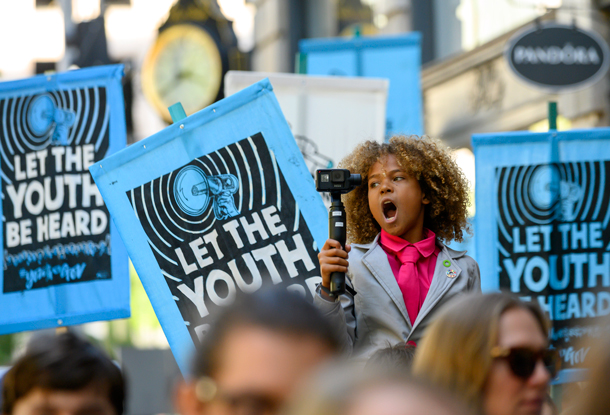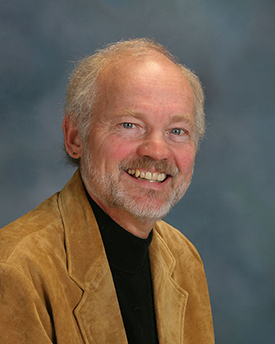Youth Climate Plaintiffs Try Again
Air Date: Week of May 28, 2021

The Juliana et al. v. United States plaintiffs first filed their lawsuit in 2015, when they ranged in age from eight to nineteen. Photographed here are some of the plaintiffs, some of their legal team, and some of their supporters outside the US States Court of Appeals for the Ninth Circuit in late 2017. (Photo: Robin Loznak)
Back in 2015 a group of young people sued the United States for failing to protect the climate and therefore their rights to a livable future, but the case was eventually dismissed. Now the Juliana v. United States youth plaintiffs have gone back to a lower court where a judge has ordered them into mediation with the Biden Justice Dept. on this matter. Young people recently won a similar case in Germany, and the European Court for Human Rights is fast-tracking a climate case brought by youth in Portugal. Host Steve Curwood gets an update from Pat Parenteau, a professor at the Vermont Law School.
Transcript
CURWOOD: Back in 2015 a group of young people sued the United States for failing to protect the climate and therefore their rights to a livable future. And after a series of appeals around procedure, in early 2020 the U.S. Court of Appeals for the Ninth Circuit finally dismissed the case, which is called Juliana v. United States. But never say never. The youth plaintiffs went back to a lower court where a judge ordered them into meditation with the federal government on this issue. Young people recently won a similar case in Germany, and the European Court for Human Rights is fast tracking a climate case brought by youth in Portugal. Pat Parenteau is a professor at the Vermont Law School he joins us now. Pat, welcome back to Living on Earth!
PARENTEAU: Thanks, Steve, good to be with you.
CURWOOD: Last time we spoke, the US Court of Appeals for the Ninth District had dismissed the Juliana v. United States case. That, of course, is the case involving the bid by young people to have the federal government look after their future and climate. What was their reasoning there?
PARENTEAU: Their reasoning was that the youth plaintiffs were asking the courts to do things that only the legislative and executive branches can do. They threw them out on the doctrine of standing. They did recognize that climate change is not only impacting these individual, young people. Some of them lived, you know, in Louisiana being flooded, some of them lived in the Arctic Circle, watching the ice disappear, and so forth. So they found injury. And they found that the government actually could possibly - this was one of those early preliminary rulings where they weren't ruling on the final merits of the case. But they said, it's possible that the government has been doing some things that are making the situation worse. Now, we all know that they have been doing those things. But the court said, at least at this juncture of the case, the plaintiffs have made out a case that the government is doing things like leasing oil and gas, promoting fossil fuel development, and so forth, that's actually making climate change worse, and impacting the future of these young plaintiffs. Where the case finally stumbled, was on the last step, which is what can the courts do about it? And there, the Ninth Circuit panel threw up their hands, and basically said, there's really nothing that the courts can do. We can't set energy policy for the country. We can't order, you know, the production of electric vehicles and so forth. All the things that are needed to really address the climate crisis; the courts are not in a position to do that. So they dismissed the case.
CURWOOD: How chicken was the court, Pat? I mean, we've seen the United States Supreme Court say that you've got to send black kids to school with white kids - ordering policy?
PARENTEAU: Yeah, I think it was a failure of the judiciary. At a minimum, they should have let this case go to trial, they should have let the young people put on their case for why now is the moment when we have to be taking decisive action and precisely what that action should be. The plaintiffs were ready to put on the stand a cavalcade of all star witnesses: scientists, engineers, economists, everybody that knows what needs to be done and what the government could be doing and should be doing. They were ready to put that on the record for all to see. And the courts really failed, in my view not to let that happen. It could have moved the needle faster if that had happened.

Youth plaintiff Levi Draheim rides on the shoulders of a supporter as he makes his way to a rally in July of 2019, following a hearing in the Juliana v. United States climate change lawsuit. (Photo: Robin Loznak/Our Children’s Trust)
CURWOOD: And yet, despite the federal court system kind of chickening out on this case, they haven't completely and the case is still alive. Why, how is it that the case is still alive?
PARENTEAU: Yeah, it's never say die. So the plaintiffs' lawyers, led by Julia Olson and several other lawyers have gone back to the Oregon Federal District Court back to Judge Aiken, who issued the original ruling, kind of a landmark ruling really, recognizing that there was a basis in the US Constitution, to a right to a climate system capable of supporting human life, something you would think and hope our constitution did provide, right. And so she said, I believe that there is a legal basis for this case, it should go to trial. But of course, subsequent events resulted in the case being dismissed, as we've discussed. Now, it's back before Judge Aiken and the plaintiffs' lawyers are asking her to reopen the case with a more narrowly focused request, that you issue a declaratory judgment that the government has this responsibility, and is failing in the responsibility, and then let the government decide what they're going to do about it, but at least go that far in the judicial process, to state that there is a basis in law to require the government to do more than it's doing, and also to stop doing some things that are making situation worse. So it's a more refined and a more narrowly focused case. And that motion to reopen the case is now pending before judge Aiken.
CURWOOD: And I understand that there is an element of mediation that has now entered into this litigation, what's going on, what's being done there?
PARENTEAU: Right. So Judge Aiken has a very interesting approach to the role of the court, and one with which I strongly agree. She characterizes her role as that of a facilitator, a convener. She's directing the government Department of Justice and Our Children's Trust, representing the Juliana plaintiffs into mediation before retired Magistrate Judge Thomas Coffin. Judge Coffin was involved in an earlier stage of the Juliana case, but he's now been retired for several years. He's a very well known federal court mediator. He's had some very successful attempts to get parties in complex cases to agree on some common ground. So he is now conducting interviews with the Biden Administration, in effect, in the Department of Justice, and with the Our Children's Trust, plaintiffs' lawyers to see if he can open a door for real negotiation. And Judge Aiken, almost like the principal of a school directing these rambunctious children to behave, she has given them stern instructions that she wants this mediation to be meaningful. She noted that things have changed, obviously, dramatically in the country since the case was first filed. We have a new administration, one that seems committed to doing all that needs to be done or as much as can be done to address the climate crisis, but still no real tangible results yet. And she said the plaintiffs have acknowledged that they probably were asking the courts to do too much in the initial round. So Judge Aiken is saying, take advantage of this new opportunity, this new moment and critical moment in time and sincerely apply yourself to trying to come up with some kind of an agreement that can move the country forward in a way that we know we need to do. A really remarkable statement, I think from a federal judge.
CURWOOD: And of course, the original case was filed, what back in 2015. Right? So we have seen six years of an angry climate imposing its wrath on civilization since then, it's a different view, even in these last six years, of the climate emergency.
PARENTEAU: Right. Last year saw the largest number of hurricanes on the Gulf Coast. This year, the USGS, US Geological Survey, is saying that last year's fire season is going to be even worse this year, which have already begun. So yes, Steve, things have gotten much worse, in the years since this case has been languishing in the courts. And Judge Aiken made specific reference to the fact that time is getting away from us. And we're in danger of having this situation spin out of control if we don't get serious.
CURWOOD: Pat, you've worked in government. In fact, at one point you were a general counsel for a Regional Office of the Environmental Protection Agency. What do you think that President Biden, the Department of Justice, and the folks who consider the environment and climate in the administration are going to do in response to this order?
PARENTEAU: Boy, I hope they do something to try to settle this case, because one of the big fears is, if the plaintiffs get stiffed, once again, by the Department of Justice in the Biden administration, they're going to try to take this case to the Supreme Court and a lot of us are very concerned with this conservative Supreme Court, and what they might do with not only the Juliana case, if it gets there, but the larger question of standing to bring any kind of case to the courts to challenge fossil fuel development. And also rule perhaps once and for all, there is no constitutional basis for a claim to a safe climate. So, you know, the Biden administration has an opportunity, if they take advantage of it to figure out an agreement that would avoid having the plaintiffs push this issue, and tempt some of the more conservative justices on the Supreme Court to take it. The trick is going to be what can the Biden administration agree to in a court settlement, that doesn't put them at jeopardy in moving forward with some of the changes they want to make to policies and rules from the last administration, because the Biden administration has to go through the same legal process to undo what Trump did, as Trump actually failed to do in setting some of these policies. So it's a tricky legal minefield that the Biden administration has to walk, but they could come up with process oriented agreements, for example, they could create a youth council and give them access at the highest levels of government through the counsel of Environmental Quality and through some of the offices that the White House has set up to move climate policy forward. In other words, they could give these young people a real seat at the table, you know. They're still not able to vote, and they're still at the mercy of their parents and the government to look out after their long term interests. But at least the Biden administration could give them some really meaningful role in moving this process forward.

Former EPA Regional Counsel Pat Parenteau teaches environmental law at Vermont Law School. (Photo: Courtesy of Vermont Law School)
CURWOOD: So, what do you think would be considered a win, then, for the youth plaintiffs in the Juliana case?
PARENTEAU: I think they're looking for something more substantive. They haven't tipped their hand on what they're looking for. But they'll probably want some firmer commitments to ending some of the policies that you know, have been promoting us in the wrong direction. And it's possible that the Biden administration could make some commitments with the kinds of qualifiers about - we have to go through normal rulemaking process, we have to follow the procedures of law so that these things all get upheld eventually, because they're going to be challenged in court by the red state attorneys general who are already suing left and right to try to block the Biden administration. So there's some things that the lawyers at the Department of Justice, I think could creatively come up with that would give the plaintiffs enough of a victory for them to claim that they have moved the needle that they've made progress. But unless the Department of Justice is willing to take some risks, and actually make some of these commitments, I fear that this latest effort at mediation may fail.
CURWOOD: Pat Parenteau is a professor at Vermont Law School and former general counsel for Regional Office of the EPA. Pat, thanks so much for taking the time with us today.
PARENTEAU: Good to spend time with you, Steve.
Links
Our Children’s Trust’s press release on Judge Aiken’s order for a settlement conference
Listen to our most recent segment on the Juliana case with Pat Parenteau
Living on Earth wants to hear from you!
Living on Earth
62 Calef Highway, Suite 212
Lee, NH 03861
Telephone: 617-287-4121
E-mail: comments@loe.org
Newsletter [Click here]
Donate to Living on Earth!
Living on Earth is an independent media program and relies entirely on contributions from listeners and institutions supporting public service. Please donate now to preserve an independent environmental voice.
NewsletterLiving on Earth offers a weekly delivery of the show's rundown to your mailbox. Sign up for our newsletter today!
 Sailors For The Sea: Be the change you want to sea.
Sailors For The Sea: Be the change you want to sea.
 The Grantham Foundation for the Protection of the Environment: Committed to protecting and improving the health of the global environment.
The Grantham Foundation for the Protection of the Environment: Committed to protecting and improving the health of the global environment.
 Contribute to Living on Earth and receive, as our gift to you, an archival print of one of Mark Seth Lender's extraordinary wildlife photographs. Follow the link to see Mark's current collection of photographs.
Contribute to Living on Earth and receive, as our gift to you, an archival print of one of Mark Seth Lender's extraordinary wildlife photographs. Follow the link to see Mark's current collection of photographs.
 Buy a signed copy of Mark Seth Lender's book Smeagull the Seagull & support Living on Earth
Buy a signed copy of Mark Seth Lender's book Smeagull the Seagull & support Living on Earth

